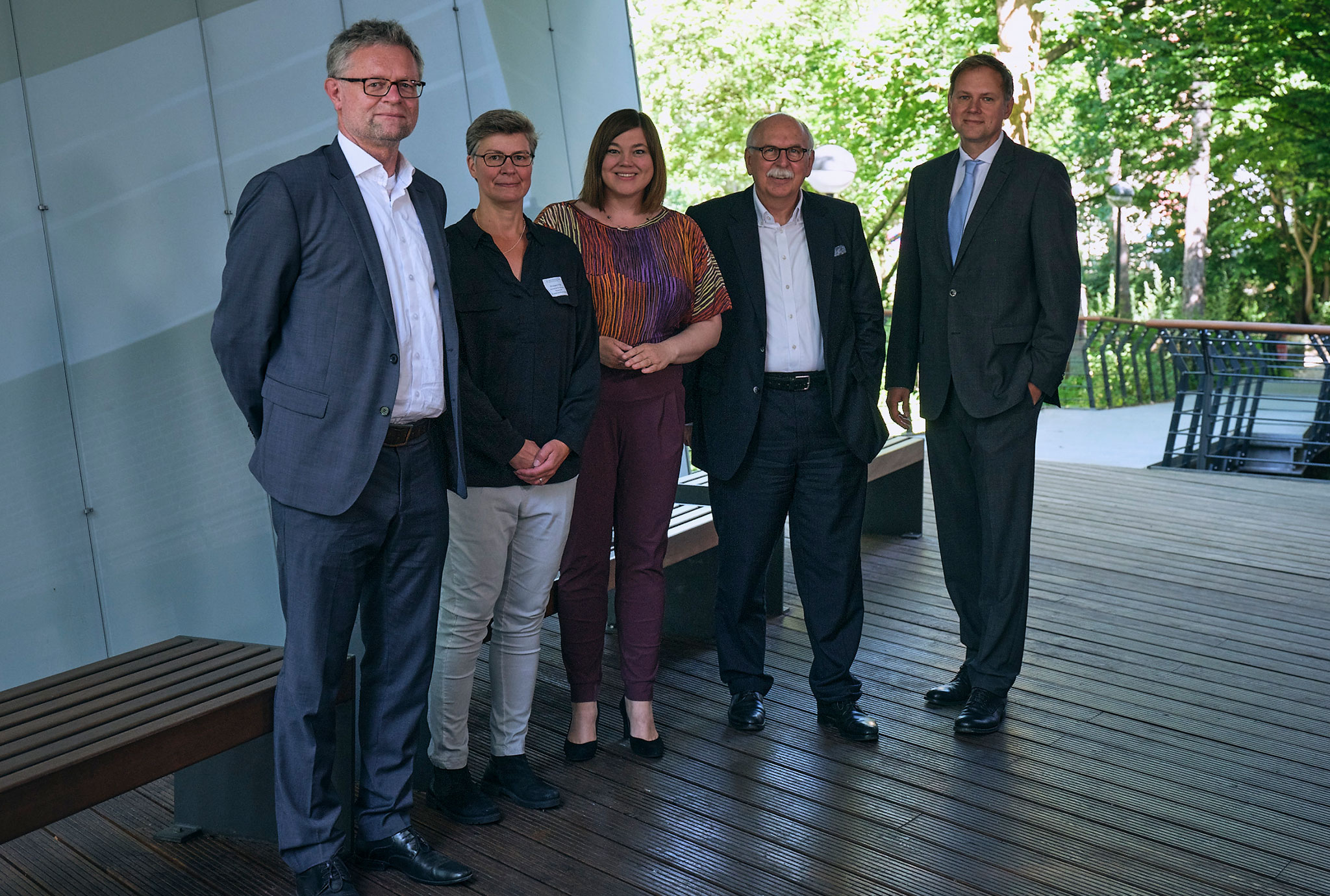One year of LIB: Researching and acting together
 At the Museum der Natur Hamburg: Prof. Dr Bernhard Misof, Dr Christiane Fricke, Katharina Fegebank, Prof. Dr Matthias Kleiner and Prof. Dr Hauke Heekeren (from left to right). © Benjamin Pichelmann
At the Museum der Natur Hamburg: Prof. Dr Bernhard Misof, Dr Christiane Fricke, Katharina Fegebank, Prof. Dr Matthias Kleiner and Prof. Dr Hauke Heekeren (from left to right). © Benjamin Pichelmann
Joining forces to preserve nature and shape the future: The Leibniz Institute for the Analysis of Biodiversity Change (LIB) began its work with this mandat one year ago during an increasing biodiversity crisis. Under the umbrella of the Leibniz Association, the LIB has since been able to align itself with the Museum Koenig Bonn and the Museum of Nature Hamburg in the field of action of science, politics and society.
Scientists of the LIB investigate in domestic regions as well as in the biodiversity hotspots of this world, how our nature functions and where the causes for the current species loss lie. They compile scientific results as a data basis for the development of measures to preserve biodiversity for future generations. The exchange with society and politics on these essential challenges of our time is an essential aspect of the work at LIB. In dialogue with stakeholders and the public, the LIB aims to bring about socially relevant action for the conservation of a diverse natural world.
In the course of the merger of the former Center for Natural History of the University of Hamburg with the Zoological Research Museum Alexander Koenig on July 1, 2021, almost 60 additional employees have been hired. Currently, more than 300 LIB staff are employed in Bonn and Hamburg. Projects with international partners such as the Caucasus Barcode of Life project (CaBOL) and the German-Ecuadorian Biodiversity Consortium (BIO-GEEC) are already underway across sites. Exhibitions such as “Urpferd 2.0” and “Multifaceted Insects” are shown in both Hamburg and Bonn. Outreach programs extend across national borders.
“We are growing together. In developing new projects, the two sites complement each other in research and knowledge transfer. We are sharpening our goals and building a structure that brings out the individual profiles of both sites while at the same time combining their strengths. In addition, we are expanding our radius of action with new buildings for research infrastructure in Bonn and a planned new natural history museum in Hamburg,” states Prof. Dr. Bernhard Misof, Director General of the LIB, on the occasion of the festive event marking the first anniversary of the LIB today, June 23, 2022. The event is also an occasion to bring together representatives from science, politics and society and to present the work of the LIB.
“Time is pressing,” Misof emphasizes, “because while we are losing the unique diversity of nature, we are only just beginning to understand it. A large part of biodiversity is still undiscovered. But only if we capture biodiversity and understand changes in ecosystems can we jointly develop meaningful countermeasures. Our Museum Koenig Bonn and the Museum of Nature Hamburg, under the umbrella of the Leibniz Association and in the interplay of research, collection, exhibition and outreach, offer a very good working basis to effectively meet the challenges of the biodiversity crisis.”
As guest speaker at the LIB celebration event, Prof. Dr. Matthias Kleiner, President of the Leibniz Association, emphasizes: “The Leibniz Research Museums form a unique, inwardly and outwardly profile-raising unique selling point of the Leibniz Association. I am pleased that this has been expanded to include the new and important location of Hamburg with the Leibniz Institute for the Analysis of Biodiversity Change (LIB).”
Katharina Fegebank, Second Mayor of the City of Hamburg and Senator for Science, Research, Equality and Districts, says: “The Leibniz Institute for the Analysis of Biodiversity Change (LIB) is an outstanding example of successful, cross-location research and profitable knowledge transfer. I am pleased that we are celebrating the first anniversary of the cooperation between Hamburg and Bonn today. Together, the two sites are doing a great job in transferring knowledge about our biodiversity and the changes in our ecosystem. The LIB has thus become an important flagship for Hamburg as a science location, which will continue to decisively shape our city in the future.”
Other speakers at the ceremony include Prof. Dr. Hauke Heekeren, President of the University of Hamburg, and Dr. Christiane Fricke, Group Leader of Non-University Research Organizations, Ministry of Culture and Science of the State of North Rhine-Westphalia.
The LIB will present itself to the public with the Museum of Nature Hamburg and the Zoology, Mineralogy and Geology-Paleontology departments on June 25, 2022, from 10 a.m. to 5 p.m. during an open house.











